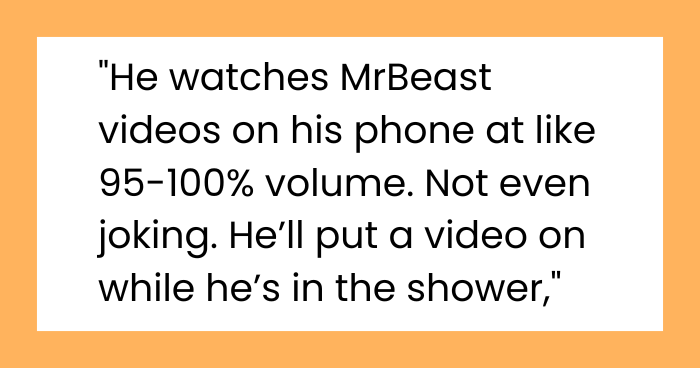Woman Threatens Divorce Over Husband’s MrBeast Obsession – Internet Debates Who’s in the Wrong

A 24-year-old wife is fed up with her 26-year-old husband’s obsession with MrBeast videos, and honestly, it’s starting to shake their marriage. Because he lost some hearing from years of DJing, he blasts YouTube content at almost full volume—early in the morning, while showering, basically whenever he feels like it. Their apartment has become an echo chamber of internet challenges and giveaways.
She’s begged him to wear headphones or at least turn it down, but he refuses. His defense? Comfort and accessibility.
But here’s the truth—it’s not just about the noise. She doesn’t like the content either. To her, MrBeast’s loud, high-energy videos feel childish and exhausting, especially coming from a man who’s pushing 30. After weeks of feeling trapped in an endless loop of stunts and giveaways, she snaps and half-jokingly threatens divorce. Her husband sulks, and now there’s tension in the air.
This isn’t just about YouTube—it’s about personal space in marriage, respect in shared living spaces, and mismatched cultural habits. One partner’s comfort can easily become the other’s stress, especially when noise pollution affects daily life and even mental health.
Experts in marriage counseling and couples therapy often say the key is communication, not ultimatums. But when hobbies clash with maturity expectations, it can feel like more than just “preferences”—it feels like disrespect.
This woman’s husband would blast MrBeast videos around the house
The wife grew so tired of this annoying habit that she started considering divorce
The Clash Between YouTube Chaos and Domestic Peace
When you joke about divorce over MrBeast videos, it’s not really about YouTube—it’s about peace, respect, and how different needs collide in marriage. On one side, your husband needs louder sound because of hearing loss. On the other, you need calm at home. That clash is more than noise—it’s a test of patience, boundaries, and emotional health.
Hearing Loss vs. Home Atmosphere
Your husband isn’t making it up—people with noise-induced hearing loss often need higher volume to hear clearly. In the shower or another room, blasting content feels normal to him. But for you, constant loud videos turn your house into an echo chamber.
Research from the World Health Organization shows exposure above 85 dB raises stress, ruins sleep, and even raises blood pressure. If your mornings start with giveaway shouts and chaotic thumbnails, no wonder you feel drained.
The Emotional Toll: More Than Annoyance
Calling the videos “childish” doesn’t capture the deeper exhaustion. Constant exposure to loud, high-energy content can:
- Spike stress and irritability.
- Break focus, even when you’re not “listening.”
- Disrupt sleep cycles.
- Create distance, making home feel less like a sanctuary.
This is noise pollution, not just irritation—and psychology studies confirm it can erode quality of life.
Communication Breakdown: Why Ultimatums Fail
Telling your spouse “I’ll divorce you if I hear another MrBeast video” may have been a joke, but it felt like an ultimatum. Marriage counselors warn ultimatums shut down empathy and create fear instead of compromise.
The real issue isn’t MrBeast—it’s the lack of healthy communication about noise, comfort, and mutual respect. When threats replace dialogue, both partners feel stuck.
Possible Solutions: More Than Headphones
You’ve tried headphones and tweaks, but there are more options:
A. Safe Volume Compromise
Use a decibel meter app. Experts say 70 dB is safe for long exposure. That gives you a number to agree on.
B. Soundproofing & Retreat Spaces
Simple fixes like white noise machines, earplugs, or assigning one “loud room” can protect your mental health.
C. Bone-Conduction or Open-Ear Headphones
Less isolating than earbuds—designed for people with hearing challenges.
D. Listening Windows
Agree on “loud hours” (like mornings or midday) and keep evenings calmer. Many couples use this approach for TV vs. quiet time.
E. Reset the Story with Empathy
Instead of nagging, explain how the noise makes you feel: “When I wake up to screaming giveaways, it stresses me all day.”
F. Shared Media Rituals
Pick calmer content together sometimes—like podcasts, music, or nature sounds. Shared rituals can soften resistance.
A Better Conversation Script
You: “I know your hearing loss makes loud volume necessary sometimes. But when the sound fills every room—especially in the mornings—it ruins my peace. I’m not asking you to stop watching. I just need some balance.”
Him: “Headphones don’t work for me.”
You: “I get that. But maybe we try open-ear headphones? Or even set certain times for louder play? That way, you get comfort, and I get quiet.”
This approach avoids blame, focuses on needs, and opens space for collaboration instead of conflict.
You’re Not Overreacting
- Science backs it up: WHO confirms loud noise harms health.
- His needs are valid: hearing loss is real.
- Your needs are valid too: peace at home matters.
- Couples therapy helps: even a few sessions can improve communication and prevent resentment.
At the end of the day, this isn’t about MrBeast—it’s about learning how to live together with respect, empathy, and compromise. If you can both shift from ultimatums to solutions, you’ll protect your marriage and your sanity.
Some commenters sided with the wife: “It’s not about MrBeast, it’s about basic respect”
Final Emotional Note: Reclaiming Your Sanctuary Together
You didn’t threaten to divorce him because you don’t love him. You mentioned that because you felt that you had no control and that your home was no longer safe. But the actual goal isn’t divorce. That is, respect, peace, and connection.
Instead of seeing the noise as a problem, you might see it as an opportunity for learning, progress, and working together. This is better than silence: a partnership based on empathy. And that’s the strongest base, louder than any video on YouTube.




















